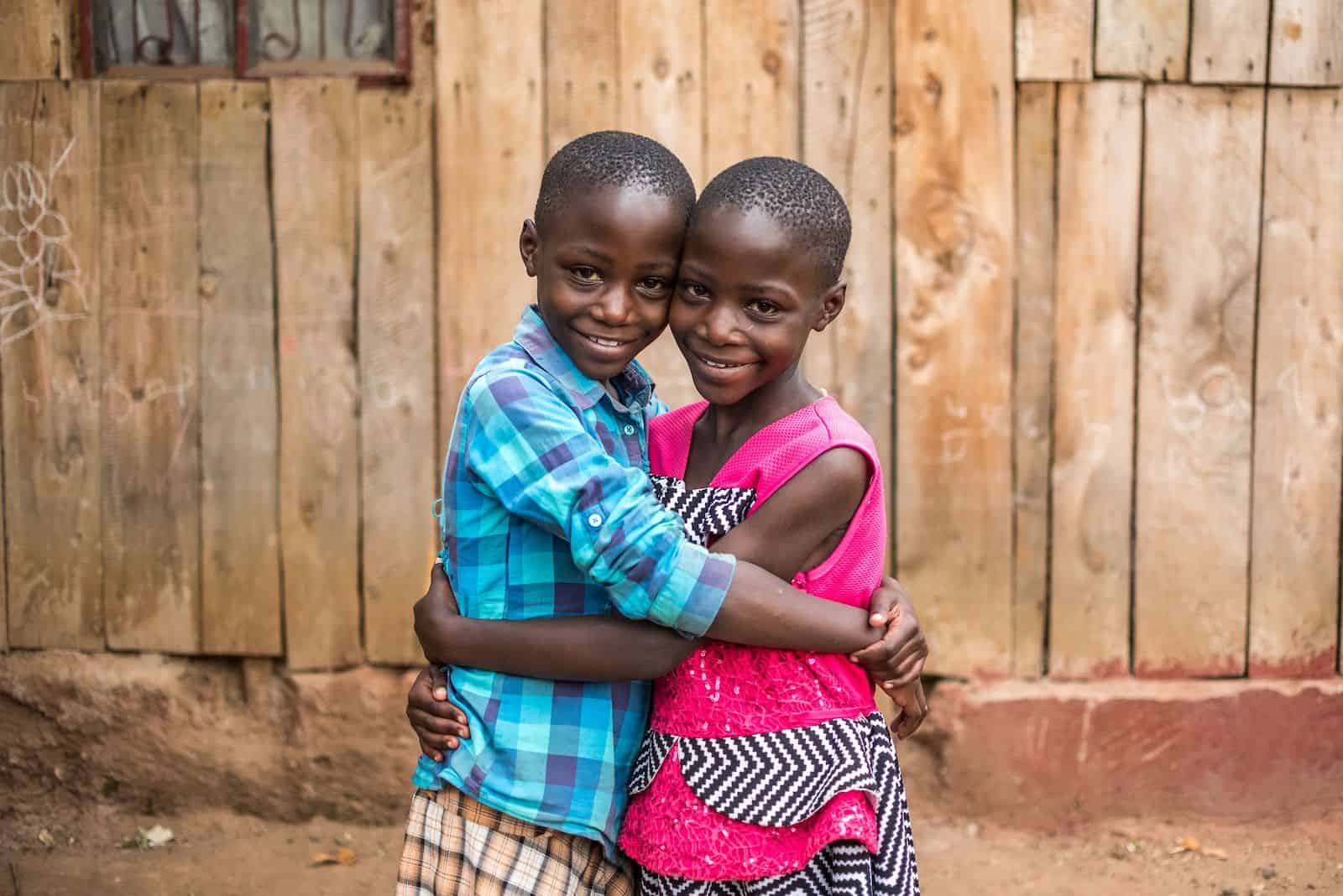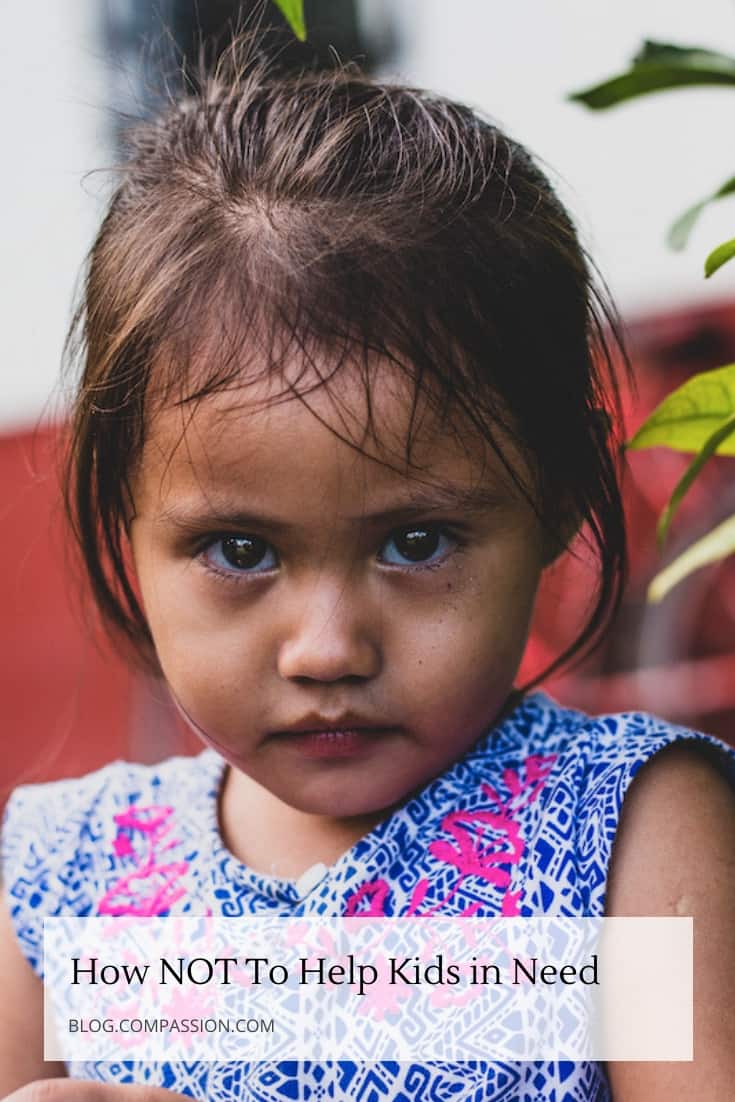Extreme poverty is a heartbreaking thing to behold. It’s especially crushing when you see how it affects an innocent and vulnerable child. When you see children suffering, the natural reaction is to ask, “How can I help kids in need?”

It’s a noble question, and one where you’re likely to find a lot of different answers. You might be tempted to think that just doing something is better than nothing. But what if, out of your desire to help, you actually hurt a child’s long-term prospects for escaping poverty? It’s a real possibility, as you’ll see. So in this article, I’d like to share with you how NOT to help kids in need.
But first, let’s define it — what is poverty, really?
I’m glad you asked! (OK, maybe you didn’t, but I bet you’re wondering about it now, right?)
This is the biggest mistake we make: defining poverty as simply a lack of material resources, thinking if we just provide more income, health care, housing, food or resources then the problem of poverty will be solved! This is bad thinking. It’s like a doctor treating a symptom instead of working to discover the root cause of an illness. And it fails to account for how people in poverty actually feel about their circumstances. So maybe we can let those who experience poverty the most describe it.
In their own words, “Poverty is … ”
In 2001, the World Bank conducted a study that asked roughly 60,000 of the world’s most impoverished people, “What is poverty?” Only 1 in 10 said anything to do with material resources. People from around the world described their poverty in terms that were psychological, social and spiritual. People living in poverty said they felt they:
- Lacked dignity.
- Were inferior.
- Had no purpose or meaning in life.
- Were failures.
- Were ashamed and denigrated.
- Were mistreated and taken advantage of.
The truth is, poverty is more than a lack of material wealth. Poverty is the lack of fulfillment, dignity and the ability to make a change. Poverty is broken systems. Poverty is the end result of a world full of broken relationships — with God, with ourselves, with Creation and with one another. And since children are the most vulnerable among us, relying on relationships to meet their basic needs, poverty’s effects are extraordinarily sinister.
So, here’s how NOT to help kids in need …
1. Only providing for their physical needs
Children aren’t one-dimensional beings. And we already discussed how poverty makes people feel. By simply caring for physical needs, we treat the symptom and not the problem. Children’s physical needs are important because hunger, lack of shelter and medical needs are often urgent and life-threatening. But to solve the problem, we can’t stop there. It takes a holistic approach.
2. Not including them in solving the problem, or thinking we know better
This is a big one because when we come in and say, “I have all the answers to your problem,” we actually remove their dignity. This approach treats them as having no influence over their circumstances. It reinforces the negative belief that they aren’t good enough and have no ability. This is a BIG lie that poverty tells children, and they need to see for themselves it’s not true. And there’s no better way to believe in your own potential than to experience it for yourself.
3. Thinking there’s an easy, quick fix and that what worked in one place will work everywhere
Poverty is complex. A writer once told me how she saw a graveyard of decaying wells near a village in Uganda. When she asked why they weren’t being used, she was told that certain organizations thought they could help, so they drilled wells. But they didn’t consider the long-term scenarios for the specific communities or seek the community’s input. It turned out that the villagers didn’t have the resources or knowledge to maintain the wells. Over time they simply crumbled or became sources of disease-infested water.
To be sustainable, any would-be solution to poverty has to be embraced and “owned” by the people experiencing it.
4. Not being in it for the long haul
The desire to help is an amazing thing. It shows you’re a kind person who wants to make the world better. But lasting change doesn’t happen overnight. Because poverty is the result of a set of intertwined, broken relationships, alleviating poverty is about restoring those relationships. Our efforts must include healing our relationships with Creation, with other people, with ourselves and — most importantly — with God. The work of restoring relationships takes time and hard, deep work. And it’s work that all of us must undertake, not just those living in poverty.
5. Thinking we can solve poverty ourselves
Here’s a secret you won’t hear from many: The truth is, we can’t end poverty, because as imperfect human beings living in a broken world, we ALL live in poverty. Some just experience it to greater degrees in more aspects of their lives. We believe there is only One who can ultimately alleviate the despair and lack that poverty brings — Jesus Christ, who restores our souls and makes things new. To end poverty, we must allow our Redeemer to work in us and through us.
So what now? Here’s how TO help kids in need.

This article is not meant to leave you feeling powerless. The truth is you can make an immeasurable difference, and you don’t have to uproot yourself, move to an impoverished community, gain the trust of the people, and then begin the work of doing life together to bring forth holistic restoration.
Compassion is already there. We partner with local churches and community leaders to determine what they need in order to become whole. We empower them to identify the assets and skills they already have. And when a child joins our program, he or she receives holistic care throughout their formative years. Here’s what happens:
- Children receive physical support to provide for their nutritional needs, their health care and shelter, while the church helps their caregivers learn effective ways to provide.
- Children learn they are loved and valuable, that they have innate talents and abilities they can develop and use to make the world a better place.
- Children learn how to speak up for themselves and for others. They learn how to engage socially and further their own education.
- Children learn that God loves them, and they see that love modeled by caring Christian adults who regularly invest in their lives.
And here’s where you come in …
Do you know who makes all of this possible? YOU!
When you support the poverty-ending work of our local church partners, God uses you to end poverty in the life of one child. When you sponsor a child through Compassion, you ensure that he or she has access to holistic development. You experience the humbling honor of entering into a supportive and encouraging relationship with a child who needs a model of Christ’s love — who needs you.
So if your strong desire is to help kids in poverty, let me encourage you to take immediate action. Choose a child and begin the fulfilling relational journey of being a sponsor today.
You will provide hope. You will help her see that she has great worth. That he has God-given potential. That God loves her so much that He sent His Son for her!








16 Comments |Add a comment
What a great article about poverty, thank you for sharing it! My family and I currently sponsor four kids and have over the past 6 years, releasing one child from poverty which is the goal. So we sponsored another child right after. The best part is I made sure that they were all at the same center in Ghana so we can go and visit and see them all at once. We love these kids like they are ours. It’s been such a blessing to watch them grow over the years. I honestly feel that not only are we helping these children but I feel it’s bringing us even more joy and happiness. I am so grateful for compassion and for all that they do.
no, its not why we do it. But God surely keeps his promises. My life could not be better. I started sponsoring a child last November. God has been pushing me to do more, I came here today and started sponsoring 2 more along with some gifts. I cant get over the joy i fill doing God’s will. Then he is like here are what i promised you, blessing after blessing. I have cried three times while on this site today. so much goodness. ALL GLORY BE TO GOD OUR FATHER IN HEAVEN!!!!!!!!!!!!!!!
I am so overwhelmed. If I could help them all I would, My heart breaks for poor children, in particular, those short on food
But I have sponsored children for years, with another organization(and now here)…and I learned something very important. Its actually counter_intuitive to some people.
I learned that in the day to day things I pay for, for my business, my personal bills, ect …I found that giving the money cheerfully each due date, affects an entire portion of your personality. I’m not a doctor, but if you begin with this, then give a little more to the other programs, then live in generosity (Try 50% standard on your restauraunt bill or $10 a day tip for your hotel maid)….you”ll find its REALLY a fun way to live!!!!
Its come to the point now, that giving the money to the programs is the first thing I do with my settlements. Why? ITS SO MUCH FUN FOR ME!!
I think I lost my point…LOL Let me say it this way…this is the JOY I get from my settlements. LOL I hope someone understood me….
Hello Marshall! Your outlook on living a life of generosity is refreshing, and definitely has a way of spreading joy. Thank you for all that you are doing for the precious children that you sponsor! ?
Excellent understanding of ‘poverty’ as explained by Kyle Davidson. As earnest as I thought I was, Kyle’s words filled gaps in my understanding; things that I didn’t grasp well and didn’t associate with the definition of poverty. That changed today. Such a grand inspiration to write to my child! God is good!
Hello,
I have been looking through the website and have been unable to find what I am looking for. We just sponsored a child today that is currently 16 years old. I am saddened that she is already 16 and not yet sponsored. I hope someone was sponsoring her previously. However, can you tell me how long the sponsorship lasts? Is it based on the child’s age or circumstances or …? I am truly hoping we can help her for a while as we really want to help make a difference in her life. I appreciate your time and help!
Thank you,
Hi Heidi! Thank you so much for choosing to sponsor Tsega. It does look like she has had a previous sponsor, so she has not been unsponsored the whole time she has been in the program, which is great news! She is expected to graduate from the program around her 22nd birthday, which is in 2025. Our completion dates are based on age and mostly happen at the child’s 22nd birthday. However, children may or may not choose to stay in the program until they reach the completion age. Some children are ready to leave after high school graduation; others may decide to stay for extra vocational training or assistance with higher education. We have found the final years of support can be extremely beneficial to their overall success, once they do leave the program and are independent. We would be happy to answer any other questions you may have. Please feel free to email us anytime at [email protected]. Blessings!
Hi Ross and everyone who commented! Being a compassion child is really having a high favor from the Lord. CI is such a heaven sent organization where children gets to know the Lord Jesus and get saved. Imagine that for every child that you support another child knows the Lord. So, this is not only financila help that you do, it is eternal investment. To God be the glory. From a former Compassion Child from the Philippines
Wow Jennifer,
This is truly a beautiful comment! Thank you so much for sharing your heart for Compassion and our program! We are honored to know it was such a blessing to you!
Thank you for reminding us of the truth aout poverty. A long, seed planting, encouraging relationship through letters can be such a fulfilling and meaningful thing for child and Sponsor.
Thank you for this insightful article. The information shared here can be helpful when writing to our sponsored children as we compose notes of encouragement and support.
i am very interested by how any one can help a kid from a poverty. mainly to help children to know how they ca survive them selves is the good way.
Hi Nathan,
Please know that it is our mission here at Compassion to do just that. You can check out information on our ministry here: https://www.compassion.com/. If you have any specific questions, feel free to email our team at [email protected]. Thank you so much and God bless you!
We as sponsors do not do it for this reason, but if you sponsor a child, pray, send extra for birthdays, visit, God will make good his promise in Malachi 3:10 to open the window of heaven and pour down blessings on YOU as well as the child ! This REALLY HAPPENS ! Come help change the world one child at a time….their changed life will have an impact on so many others.
Thanks to the CI ministry for making a Life Changing difference in both the Spiritual & Physical lives of the kids that enter into your program! I am honored & blessed to be able to sponsor 2 kids through your program.
Thanks also for this very thorough & insightful definition & explanation of the word “Poverty”, it’s formal definition and it’s “human” impact in all aspects of life.
William,
Thank you so much for your sweet post! We are honored by your support and your heart to sponsor! Thank you for choosing to be part of our Compassion family!